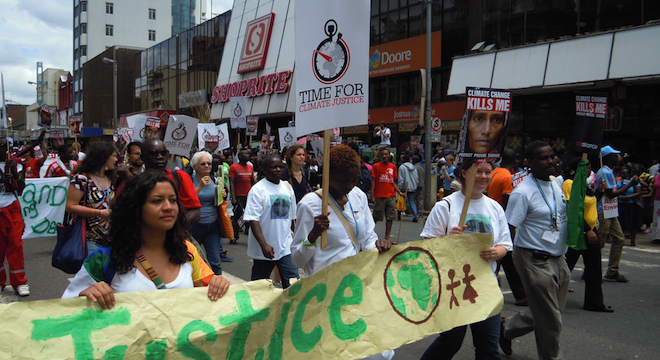EMILY GERTZ
At the 17th annual U.N. climate summit in Durban, South Africa, European officials are exasperated with the negotiating impasse created by the United States and China.
“What is really frustrating to see is this conference is again hijacked by the Ping-Pong game between the U.S. and China,” said Joe Lien, chairman of the European Parliament’s delegation at the talks, the New York Times reported Wednesday.
“It is unacceptable and no more tolerable that this game is blocking the overall process. Now that China has done some moves, let’s test their seriousness,” he continued, referring to China’s recent offer to accept legally binding emissions cuts, but only under the condition that the U.S. do the same.
The Obama administration has countered that commitments should be voluntary, and everything will be all right if everyone just does what they promised to do under the agreements reached in Cancun, Mexico in December 2010.
Todd Stern, the American special envoy on climate change, defended the fact that those agreements are not legally binding.
“It’s politically and morally binding,” Stern said, the Vancouver Sun reported.
“Of course, this soft stance is largely because our negotiators (and the rest of the world) know that the US is going to be a hard sell on a treaty. No one needs to be reminded that there’s still no domestic climate policy in the US,” commented Kate Sheppard at Mother Jones.
Even under voluntary carbon cuts, the U.S. would have to start reporting on its emissions reductions to other nations, but so far, the U.S. has resisted getting specific, with negotiator Stern only citing an unofficial figure that the country managed to cut emissions 6 percent since 2005.
Meanwhile, European Union has steadily supported creating a new treaty under the same framework as the Kyoto accord.
Under Kyoto, most member nations have been cutting emissions, trading carbon credits, and funding mitigation projects in other countries. Three E.U. members–Germany, Sweden, and the United Kingdom–are top-ranked by an independent scientific assessment for their leadership on fighting global warming, as Deutsche Welle reported on Tuesday.
But the E.U.’s influence at recent climate talks has been overshadowed by other players: in addition to the U.S. and China, the major developing nations of Brazil, India, and Russia.
India has scored a moral victory of sorts at Durban, the Hindustan Times reported Wednesday: Its positions on issues around “climate equity” have been written into the primary negotiating document. “The 137 page amalgamation draft, details about importance of equity with relation to ‘historical responsibility’ of the rich nations to reduce emissions and providing finance and technology to the developing world to keep their emissions under check,” reports the paper.
Developing nations allied to get India’s concerns into the text, as well as to block a seeming counter-move by Russia, the Times of India reported.
Russia’s proposal would have seen these countries “graduate into the list of nations that are required to take emission cuts under the climate compact,” presumably as their economies and emissions grow in coming years.
India has stated that it will not agree to legally binding emissions cuts under a new treaty. The stance would seem to affirm Canada’s stated reason for pulling out of the Kyoto agreement. ”
The Kyoto Protocol is not where the solution lies — it is an agreement that covers fewer than 30 per cent of global emissions,” said Canadian Environmental Minister Peter Kent, “Kyoto, for Canada, is in the past.”
At an early evening press conference, some non-governmental groups gave their takes on the state of the conference.
Talks about the Green Climate Fund have picked up speed since last week’s stall, said Ilana Solomon of ActionAid USA.
Despite some ongoing unresolved issues–including what role the private sector will play in both contributing to and using the fund’s money, “all countries recognize importance of agreement on the Green Climate Fund at Durban,” Solomon said. But she also added that “the US seems to be leading a great escape to its obligation to provide this climate cash.”
Asked by a reporter if the talks would ultimately succeed or fail, Jennifer Haverkamp of Environmental Defense Fund didn’t make a prediction. “If I was willing to answer questions like that, I would be buying lottery tickets too,” she said.
Haverkamp said that she is still hoping for a breakthrough, suggesting that it wasn’t unusual to find the U.S., the E.U., and China at loggerheads at this point in the meeting. “That’s always why these last days of the talks are so nail-biting.”









